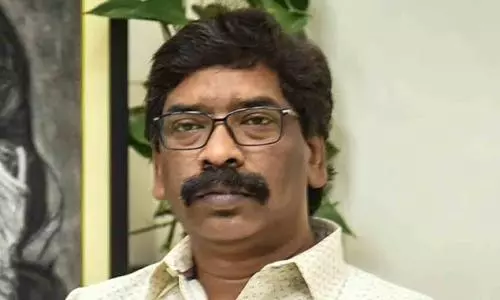
No fundamental right to privacy, its multi-faceted: Centre to SC
text_fieldsNew Delhi: The Central government on Thursday told the Supreme Court that there is "no fundamental right to privacy", as it is multi-faceted and every facet will not be eligible to claim the status of a fundamental right.
Attorney General K.K. Venugopal told a nine-judge constitution bench headed by Chief Justice J.S. Khehar that "India had declined to introduce privacy as fundamental right as is evident from the Constituent Assembly Debates. But now the court is being asked to hold privacy as fundamental right, which should be rejected".
"There is no fundamental right to privacy. Even assuming privacy can be raised to the status of liberty, it is multi-faceted and every facet will not be eligible to claim the status of fundamental right," he added.
On Wednesday too, the Central government had told the court that the right to privacy was a fundamental right but not all its facets can be elevated to the status of fundamental rights.
Maharashtra also joined the debate on right to privacy and senior advocate Aryama Sundaram, appearing for the state, echoing the stand that privacy is not a fundamental right.
"The basic question is whether privacy is a fundamental right. This will necessarily mean we will have to read in all aspects of privacy. Hence, submission by the petitioner that certain facets of privacy are a fundamental right while others may not be, would mean that the genus of privacy cannot be conferred the status of fundamental right," he added.
Sundaram said that privacy is not a fundamental right, there can be rights whose violation may be considered as violation of a stated fundamental right.
"That right may also be violation of privacy but that would not make privacy a fundamental right. Before we confer something status as fundamental right, we need to know what exactly the right is. Privacy is just a concept," counsel said.
He said that concept of privacy is all encompassing, and "to have it as a fundamental right would amount to injecting an expression with ambiguity and vagueness into the Constitution, something which was expressly rejected by Constituent Assembly".
"Expressions like freedom of speech, movement etc. are concepts which have an exactitude. However, privacy is a word without exactitude. It is an inchoate expression," Sundaram said.
On Wednesday senior advocate Kapil Sibal, representing non-BJP ruled states Karnataka, West Bengal, Punjab, Himachal Pradesh and Puducherry, had backed the constitutionality of the right to privacy.
Sibal had told the court that these states supported the contention that the right to privacy be held as fundamental in the age of technological advancements.
The nine-judge bench is examining the nature of privacy as a right and also the correctness of two judgments of 1954 and in 1962 which had held that right to privacy was not a fundamental right.
The matter is being heard by the constitution bench in the wake of challenge to the Aadhaar scheme on the grounds of its being violative of the right to privacy.
Petitioners include former Karnataka High Court judge Justice K.S. Puttaswamy, first Chairperson of the National Commission for Protection of Child Rights and Magsaysay award recipient Shanta Sinha, feminist researcher Kalyani Sen Menon and others who have challenged the validity of the Aadhaar scheme on grounds of it being violative of the right to privacy.
The hearing will continue on Tuesday.























